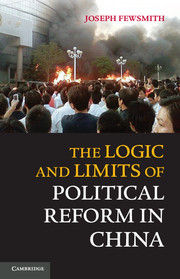4 - Wenzhou
Social Capital without Civil Society
Published online by Cambridge University Press: 05 January 2013
Summary
Inner-party democracy was one response to growing social tensions and abuses of power. It was pioneered in Sichuan but spread to other provinces, although mostly to the poorer parts of those provinces where local leaders lacked resources to spur economic development. The developed areas along the east coast presented different challenges. More than any other province, Zhejiang developed around the private economy, minimizing the role of the state. Moreover, it was not long before entrepreneurs began forming business associations. This pattern of development suggests that Zhejiang could pioneer a turn toward civil society. Students of civil society have generally looked to various nongovernmental organizations (NGOs) to support their hope that democratizing trends are emerging in China. The emergence of NGOs is certainly an important story in contemporary China, but it is not clear precisely how they are expected to promote democratization: through the cultivation of civic values? Through resistance to the authoritarian state? Through the delegitimization of the state? Through the creation of a public sphere outside the control of the state, which would, in turn, impose constraints on the state and turn it, however incrementally, toward the rule of law and acceptance of citizen participation in political affairs? Furthermore, most students of NGOs do not focus on business associations, perhaps because such associations are thought to be too close to the state; “real” NGOs are presumed to be more independent of, and perhaps hostile to, the state.
However, business associations seem to be likely vehicles for building institutionalized state--society relations in China. Entrepreneurs have an interest in a predictable environment, and curbing the arbitrary actions of local state officials would generally benefit the private sector. In addition, from the state's point of view, entrepreneurs are a benevolent social force, providing the sort of growth that the state is encouraging. Despite debates about admitting entrepreneurs into the party – something that was done surreptitiously at first and then openly under Jiang Zemin's “Three Represents” policy – local political elites and entrepreneurs have accommodated one another quite well. Thus, if there is one social force the state is likely to feel relaxed about, it is the entrepreneurs.
- Type
- Chapter
- Information
- The Logic and Limits of Political Reform in China , pp. 108 - 141Publisher: Cambridge University PressPrint publication year: 2013

